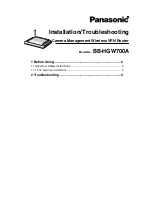
Introduction
Introduction
3
Introduction
se
ct
io
n
1
2
3
4
5
6
7
8
9
2. Avoid Obstacles and Interference
Avoid placing your
Router near devices that may emit radio
“noise”, such as microwave ovens. Dense objects that can inhibit
wireless communication include:
•
Refrigerators
•
Washers and/or dryers
•
Metal cabinets
•
Large aquariums
•
Metallic-based UV tinted windows
If your wireless signal seems weak in some spots, make sure that
objects such as these are not blocking the signal’s path (between
your computers and Router.
3. Cordless Phones
If the performance of your wireless network is impaired after
attending to the above issues, and you have a cordless phone:
•
Try moving cordless phones away from Routers and your
wireless-enabled computers.
•
Unplug and remove the battery from any cordless phone that
operates on the 2.4 or 5GHz band (check the manufacturer’s
information). If this fixes the problem, the phone may
be interfering.
•
If your phone supports channel selection, change the
channel on the phone to the farthest channel from your
wireless network. For example, change the phone to channel
1 and move your Router to channel 11. See your phone’s
user manual for detailed instructions.
•
If necessary, consider switching to a 900MHz
cordless phone.
4. Choose the “Quietest” Channel for your Wireless Network
In locations where homes or offices are close together, such as
apartment buildings or office complexes, there may be wireless
networks nearby that can conflict with yours.
Use the Site Survey capabilities found in the Wireless Network
Utility of your wireless adapter to locate any other wireless
networks that are available (see your wireless adapter’s user






































